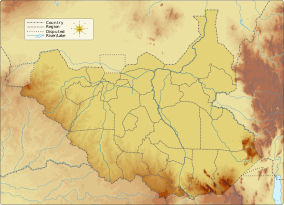The Bandingilo National Park, sometimes spelled Badingilo, is a national park located in South Sudan's Equatoria region. The park covered the erstwhile states of Central Equatoria and Eastern Equatoria. It was established in 1992.[1] Situated in a wooded area near the White Nile river, it is over 10,000 square kilometres (3,900 sq mi) in size.[2] It also contains large marshlands stretching up into Jonglei state.[3]
| Bandingilo National Park | |
|---|---|
| Location | Equatoria, South Sudan |
| Nearest city | Juba |
| Coordinates | 5°25′58″N 32°16′39″E / 5.43278°N 32.27750°E |
| Area | 10,000 km2 (3,900 sq mi) |
| Established | 1992 |
 | |
The world's second-largest annual animal migration takes place when multiple species of antelope, including Bohor reedbuck, tiang, and white-eared kob, move between Bandingilo Park and Boma National Park.[4] In 2021 it was estimated the migration included 1 million kob and 200,000 tiang.[5] A 2023 survey found it may be the largest migration, including 5 million white-eared kob, 350,000 Mongalla gazelle, 300,000 tiang, and 160,000 bohor reedbuck.[6] The migration happens from January to June. The animals move from Bandingilo into Boma and the Gambella National Park in Ethiopia. Then the pattern is reversed from November to January.
The park is also home to the critically endangered species of the Nubian giraffe, Northeast African cheetah, and Northern lion. Additionally there are African wild dog, caracal, and spotted hyena. The park supports large bird populations, estimated to be 400 species in 2021.[5] It has been named an Important Bird Area.
During the wet season, the grasslands are flooded. Then during dry season there is extensive burning. This helps maintain the grassland habitats.[4]
History
editOn 6 July 2011, three days before South Sudan formally seceded from Sudan, an administrative headquarters was officially opened at a ribbon-cutting ceremony led by Central Equatoria Governor Clement Wani.[2]
In August 2022, African Parks signed a 10-year renewable agreement with the government of South Sudan to manage Bandingilo and Boma National Parks.[7] Prior to that the parks were managed by the Ministry of Environment and Forestry, and the Ministry of Wildlife Conservation and Tourism.[4]
Conservation
editThe 22-year long war between Sudan and South Sudan did not appear to affect the animal populations in the area the park now covers.[8] But the development of the new country became a threat. Additional conflict lasted from around 2013 to 2020. As of 2021, conservationists are unable to monitor the effects to animal populations and habitats.[5]
Though a major wildlife preserve, the park lies within a Total S.A. oil concession, potentially exposing it to surveying and drilling.[2]
See also
editReferences
edit- ^ "National Parks of Sudan". Archived from the original on 2011-04-23. Retrieved 2011-07-23.
- ^ a b c "South Sudan's wild hope for the future". France24. 2011. Retrieved 22 July 2011.
- ^ Southern Sudan - Wildlife Conservation Society
- ^ a b c "Boma-Badingilo Migratory Landscape (Contiguous site)". UNESCO. 10 April 2017. Retrieved 20 February 2024.
- ^ a b c "White-eared kob and tiang migration South Sudan". African Geographic. 16 June 2021. Retrieved 20 February 2024.
- ^ Graeme Green (25 June 2024). "Migration of 6m antelope in South Sudan dwarfs previous records for world's biggest, aerial study reveals". The Guardian. Retrieved 26 June 2024.
- ^ "Government of South Sudan Signs Major Agreement with African Parks to Manage Boma and Badingilo National Parks". www.africanparks.org. Retrieved 2023-05-22.
- ^ Rucker, Angela (Sep 2011). "Sudan's Wildlife Migration Miracle". Frontlines. Retrieved 20 February 2024.
